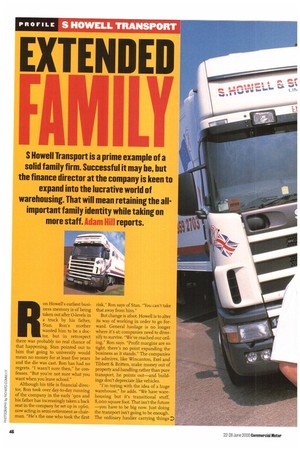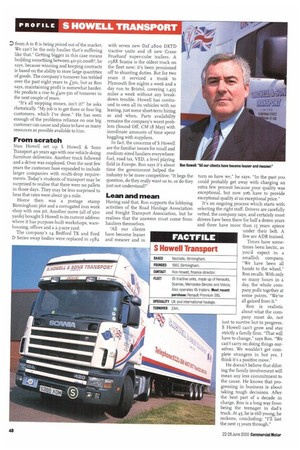S Howell Transport is a prime example of a solid
Page 48

Page 50

If you've noticed an error in this article please click here to report it so we can fix it.
family firm. Successful it may be, but the finance director at the company is keen to expand into the lucrative world of warehousing. That will mean retaining the allimportant family identity while taking on more staff. Adam Hill reports.
on Howell's earliest business memory is of being taken out after 0-levels in a truck by his father, Stan. Ron's mother wanted him to be a doc tor, but in retrospect I there was probably no real chance of that happening. Stan pointed out to him that going to university would mean no money for at least five years and the die was cast. Ron has had no regrets. "I wasn't sure then," he confesses. "But you're not sure what you want when you leave school."
Although his title is financial director, Ron took over day-to-day running
I: of the company in the early '9os and ., his father has increasingly taken a back . seat in the company he set up in 1960, . now acting in semi-retirement as chair; man. "He's the one who took the first
risk," Ron says of Stan. "You can't take that away from him."
But change is afoot. Howell is to alter its way of working in order to go forward. General haulage is no longer where it's at; companies need to diversify to survive. "We've reached our ceiling," Ron says. "Profit margins are so tight, there's no point expanding the business as it stands." The companies he admires, like Wincanton, Exel and Tibbett & Britten, make money out of property and handling rather than pure transport, he points out—and buildings don't depreciate like vehicles.
"I'm toying with the idea of a huge warehouse," he adds. "We have warehousing but it's transitional stuff, 8,000 square foot. That isn't the future —you have to be big now. Just doing the transport isn't going to be enough. The ordinary haulier carrying things 0 from A to B is being priced out of the market. We can't be the only haulier that's suffering like that" Getting bigger in this case means building something between 4o-5o,000ft2, he says, because winning and keeping contracts is based on the ability to store large quantities of goods. The company's turnover has trebled over the past eight years to L3m, but as Ron says, maintaining profit is somewhat harder. He predicts a rise to L4m-5m of turnover in the next couple of years.
"It's all stepping stones, isn't it?" he asks rhetorically. "My job is to get three or four big customers, which I've done." He has seen enough of the problems reliance on one big customer can cause and plans to have as many resources as possible available to him.
From scratch
Stan Howell set up 5 Howell RE. Sons Transport 40 years ago with one vehide doing furniture deliveries. Another truck followed and a driver was employed. Over the next few years the customer base expanded to include larger companies with multi-drop requirements. Today's students of transport may be surprised to realise that there were no pallets in those days. They may be less surprised to hear that rates were about 3p a mile.
Home then was a postage stamp Birmingham plot and a corrugated iron work shop with one pit. Another move (all of 5oo yards) brought S Howell to its current address where it has purpose-built workshops, warehousing, offices and a 2.5-acre yard.
The company's 14 Bedford TK and Ford D Series swap bodies were replaced in 1982
with seven new Daf 2800 DKTD tractive units and 18 new Crane Fruehauf super-cube trailers. A 1988 Scania is the oldest truck on the fleet now; it's been pensioned off to shunting duties. But for two years it serviced a trunk to Plymouth five nights a week and a day run to Bristol, covering 1,455 miles a week without any breakdown trouble. Howell has continued to own all its vehicles with no leasing, just some short-term hiring as and when. Parts availability remains the company's worst problem (Sound Off, CM 18 May) with inordinate amounts of time spent haggling with suppliers.
In fact, the concerns of S Howell are the familiar issues for small and medium sized hauliers everywhere: fuel, road tax, VED, a level playing field in Europe. Ron says it's about time the government helped the industry to be more competitive: "It begs the question, do they really want us to, or do they just not understand?"
Lean and mean
Having said that, Ron supports the lobbying activities of the Road Haulage Association and Freight Transport Association, but he realises that the answers must come from hauliers themselves.
"All our clients have become leaner and meaner and in
turn so have we," he says. "In the past you could probably get away with charging an extra few percent because your quality was exceptional, but now yati have to provide exceptional quality at an exceptional price."
It's an ongoing process which starts with selecting the right staff. Drivers are carefully vetted, the company says, and certainly most drivers have been there for half a dozen years and three have more than 15 years apiece under their belt. A few are ADR trained.
Times have sometimes been hectic, as you'd expect in a smallish company. "We have been all hands to the wheel," Ron recalls. With only so many hours in a day, the whole company pulls together at some points. "We've all gained from it."
Ron is realistic about what the company must do, not just to survive but to progress. S Howell can't grow and stay strictly a family firm. "That will have to change," says Ron. "We can't carry on doing things ourselves. We wouldn't get complete strangers in but yes, I think it's a positive move."
He doesn't believe that diluting the family involvement will mean any less commitment to the cause. He knows that progressing in business is about taking tough decisions. After the best part of a decade in charge, Ron is a long way from being the teenager in dad's truck. At 45, he is still young, he reckons, concluding: "I'll last the next 15 years through."
















































































































